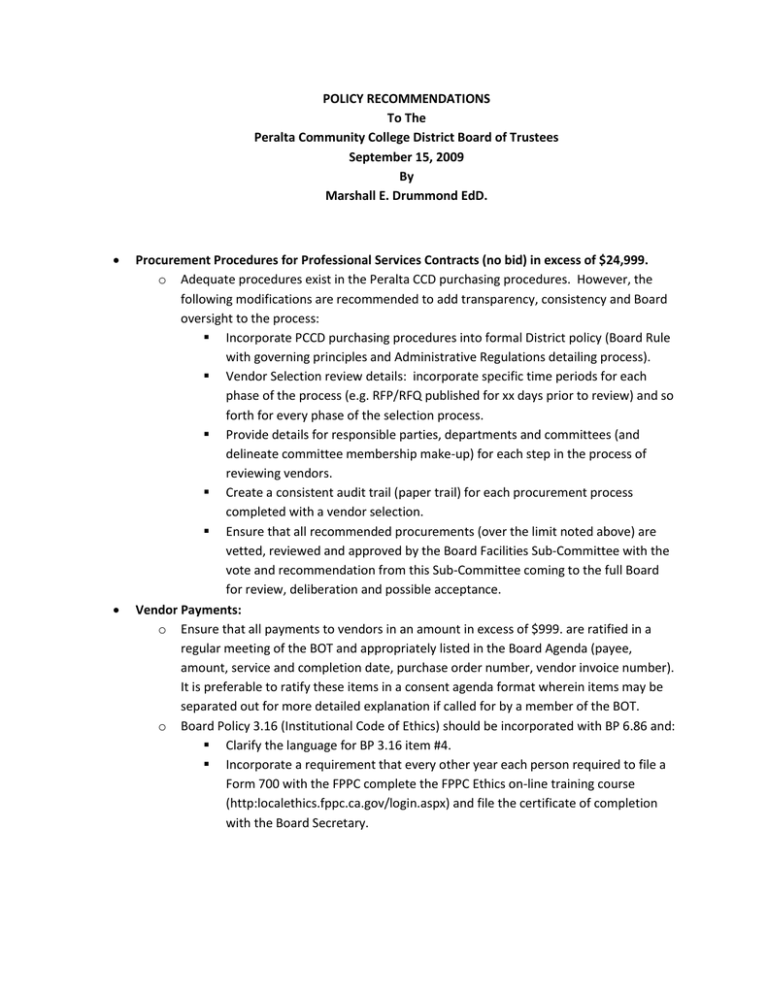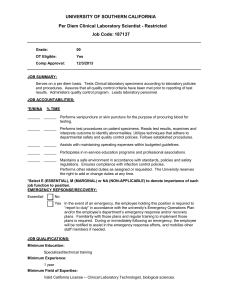Dr. Drummond Recommendations
advertisement

POLICY RECOMMENDATIONS To The Peralta Community College District Board of Trustees September 15, 2009 By Marshall E. Drummond EdD. Procurement Procedures for Professional Services Contracts (no bid) in excess of $24,999. o Adequate procedures exist in the Peralta CCD purchasing procedures. However, the following modifications are recommended to add transparency, consistency and Board oversight to the process: Incorporate PCCD purchasing procedures into formal District policy (Board Rule with governing principles and Administrative Regulations detailing process). Vendor Selection review details: incorporate specific time periods for each phase of the process (e.g. RFP/RFQ published for xx days prior to review) and so forth for every phase of the selection process. Provide details for responsible parties, departments and committees (and delineate committee membership make-up) for each step in the process of reviewing vendors. Create a consistent audit trail (paper trail) for each procurement process completed with a vendor selection. Ensure that all recommended procurements (over the limit noted above) are vetted, reviewed and approved by the Board Facilities Sub-Committee with the vote and recommendation from this Sub-Committee coming to the full Board for review, deliberation and possible acceptance. Vendor Payments: o Ensure that all payments to vendors in an amount in excess of $999. are ratified in a regular meeting of the BOT and appropriately listed in the Board Agenda (payee, amount, service and completion date, purchase order number, vendor invoice number). It is preferable to ratify these items in a consent agenda format wherein items may be separated out for more detailed explanation if called for by a member of the BOT. o Board Policy 3.16 (Institutional Code of Ethics) should be incorporated with BP 6.86 and: Clarify the language for BP 3.16 item #4. Incorporate a requirement that every other year each person required to file a Form 700 with the FPPC complete the FPPC Ethics on-line training course (http:localethics.fppc.ca.gov/login.aspx) and file the certificate of completion with the Board Secretary. Travel Policy: o Keep per diem rates realistic and train employees on rules, limitations and process for using per diem while traveling on District business. o Utilize the per diem process with all employees and BOT members while traveling on District business. Per Diem is a travel entitlement and receipts for purchases within the per diem limit should not be required for submission. o Stipulate travel rules for advance planning and best rate models for travel and accommodations. Use of District Credit Cards: o Supplies and routine purchases should be made through District purchasing. Frequently needed supplies (printer cartridges for instance) should be kept in the Board Office for BOT members to access when needed. o Travel and lodging, memberships and conference fees may be charged to District credit cards with prior approval. o Meals and entertainment should not be charged to District credit cards. Per Diem rates and the per diem process should be adhered to. Entertaining for District advancement should be supported by non-appropriated funds (auxiliaries or foundation accounts) as deemed appropriate. o There should be sanctions for repeated miss-use of District credit cards. o Distribution of District credit cards must be carefully controlled. The BOT should seriously consider abandoning the current cards and practices in favor of switching to the Cal Card (offered by the State Department of General Services). The Cal Card offers State negotiated prices and superior reporting, oversight and control of all expenditures. Salary Administration for Managers: o The evaluation process currently in place is commendable and well utilized, however it is not directly tied to compensation. o Consideration should be given to adopting a tool such as “survey monkey” for gathering peer review information to cut down on paperwork and complexity. o Salary schedules should be developed for all management categories (within the min/max ranges established). The Board should approve the schedules and the min/max ranges but not the progression within these ranges. The Board would review overall evaluation and step movement in closed session annually. o Rating-in for newly hired managers should be clearly defined. Annual step movement should be tied to evaluation outcomes, with two steps awarded for “exceeds”, one for “meets”, and none for “partially meets” or “does not meet.” o Salary schedules should be periodically evaluated for regional equity and competiveness. All schedules, faculty, staff and management should be reviewed and adjusted at the same interval using like criteria to avoid inequities between employee categories.

